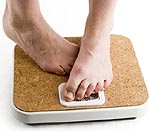Scale and Weight Loss

The scale has always been used as the most popular method to measure your body weight and it is commonly used when dieting to measure weight loss success. But the scale can oftentimes put a damper on your weight loss success, especially when that needle doesn't budge.
If you have been exercising hard and eating clean all week, the most disappointing thing is stepping on that scale at the end of the day, only to be informed that you have not lost a single gram. This kind of disappointment often leads to binge eating, because you are now disappointed and angry at your efforts, so you compensate by indulging in all the things you think you’ve been depriving yourself of.
The best advice I can give you is to stay as far away from the scale as possible. Really, stay away from it altogether and avoid the temptation to "check up" on yourself every day. If you absolutely must know your "weight" then only check it once a week, and try to measure yourself at around the same time and after you’ve been to the loo. The best time is early in the morning, on an empty stomach as your weight fluctuates throughout the day.
The scale can only measure your body weight as a whole. Included in that reading is the total mass of your bones, organs, water weight, muscle weight as well as fat weight. Another important factor to remember with exercising and dieting correctly, is that you often gain muscle and lose fat. Muscle weighs five times more than fat, so if you’ve gained 1 kilogram of muscle and lost 0.5 kilograms of fat, the scale will show that you have gained mass. Even though it is beneficial to gain muscle, the scale will tell you that you have put on “weight”, which you interpret as “fat”.
Just remember the scale measures mass and cannot tell you how fat or how thin you may be. So, the next time you step on that scale, bear that in mind. Get yourself a cost effective and effective tape measure to measure yourself at the end of each week and determine your weight loss success based on that, the mirror and most importantly, how you feel.
Write all your scores down and compare them on a weekly basis. Whichever method you chose to measure your weight loss, ensure you are giving yourself at least a week to measure the results.
Author: Dimi Ingle.
Copyright 2009: Remedium. This article may not be copied, in whole or in part, without the written consent of Remedium.
|